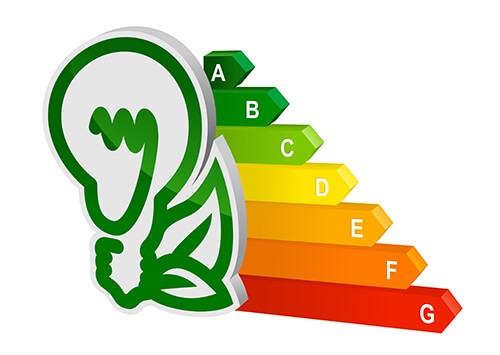
If you’re planning on installing a new heating system, it’s important to purchase the right type of heater. Some heating systems will use more energy than others, so it’s important to know how much energy your heater will use before purchasing one. It may also be helpful to know how much money you can save by purchasing a more efficient system. To find an estimate of the amount of energy your heater uses, you’ll need to determine the heating load (how much heat is needed at any given time). The type of space, its size, insulation levels, and other factors will affect this. In this article, we have compiled several ways to determine the energy efficiency of your heater.
1. AFUE Rating
The AFUE rating is a number that indicates how much energy a heating system uses in comparison to a standard heating system. The higher the number, the more efficient the heater will be. To get an estimate of your heater’s AFUE Rating, determine how much heat your room needs. For a typical space, a heater’s AFUE Rating should be in the range of 75–100%. The ideal number will depend on the size of the area being heated. If the area is just used for a short period, a lower AFUE Rating can be used. If it’s an area used for most of the day, you’ll need to increase your heater’s AFUE Rating. To do this, you will have to use more warm air with your heater to keep it from overheating.
2. Energy Efficiency Rating
The Energy Efficiency Rating (EER) is a number that indicates the amount of energy that is consumed by a given heating system per hour. To determine your heater’s EER, you will need to consider your space’s size and the length of time it’s used for. The larger the space, the greater the energy efficiency rating needs to be efficient enough for everyone to use. If the space is being used for only a short time, the heating system’s EER should be higher. For frequently used spaces, you can expect to see an EER between 10% and 15%.
3. Age of Heater
It’s also important to determine the age of your heater. If you have an older model, it may be using more energy than is necessary for heating your space. You can calculate how much energy your heater uses by multiplying the AFUE Rating with the EER. This will give you an estimate of its actual energy efficiency. If this amount exceeds 115%, you can improve the heater’s efficiency by installing a new one.
4. Use Programmable Thermostat
If you have a programmable thermostat, it’s important to ensure that you are using it properly. You can use a programmable thermostat in conjunction with your heater to keep your home more energy-efficient. If your heater isn’t being used for a long period, try lowering the heating setting to save energy. It is also important that you don’t change the settings when you leave the house to avoid unnecessary heating costs.
5. Energy Bill’s Comparison to Other Costs
You’ll also need to consider what the energy bill will be like for other expenses such as food, housing, and other costs. You can use your monthly statements to determine how much energy will be allocated for each of these expenses. If you feel that your heating costs are too high, try getting a more energy-efficient heater using the tips listed above. But if you feel your heater is working as well as possible, you can save on some of those other expenses. In either case, it’s always better to have an energy-efficient system that saves you energy costs.
6. Current System’s Efficiency
Another way to determine the efficiency of a system is by finding a firm that specializes in assessing heating systems like us. Our company may give you a comprehensive review of your current system and how efficient it is. We can also tell you how much money you could save by making the changes we advise you. Although these steps may be a little time-consuming, they’re well worth the effort if it means that you can save more money and help the environment simultaneously.
7. Location of Heater
If your heater is located in an area that gets a lot of hot air, it could be affecting its efficiency. Try moving the heater to an area that receives less direct sunlight or heating, depending on what type of space you’re heating. The outside of your home can also affect your heating system’s efficiency. If you live in a cold location, this may be the cause why your heater isn’t as efficient as it should be. If this is the case, you can try insulating your home to help warm it up. This will also help keep your heating system more efficient.
8. Type of Heater
Many heaters use more energy than others, so find the right heater for your specific heating needs. If you have several people in your home, you’ll need to purchase a heater that has a higher BTU rating to keep everyone warm. The type of heating system you have also played a role in its efficiency. For example, if you have an electric heater, consider purchasing a furnace. You can also save energy by using a wall-mounted heater instead of one placed on the floor. Our company can help you determine which heater is best for your home. for heating repair and installation in San Antonio and surrounding areas, our experienced technicians at Beyer Air Conditioning & Heating can assist you.
9. Conduct an Airtight Test
If you are unsure if your heating system is sealed up well enough, you can conduct an airtight test. You’ll need to close all of your doors, windows, and other openings in the house. Then, bring out a smoke detector or candle. Wave one end near the heater’s vents and check the smoke detector. If you hear a beeping noise or see an area of smoke, likely, your system isn’t airtight. You will need to call a professional heating company like us to repair your heating system to fix this problem.
10. Enthalpy
Another estimate of how efficient your heater is can be achieved by using the energy efficiency estimation form. This will provide you with an estimate of how efficient your heater is compared to the average furnace in its class. This doesn’t take into consideration your space’s size, however. Conversely, an excessively high estimate means a need for major improvements in the heating system’s efficiency, which may require it to be replaced entirely.
If you’ve been experiencing problems with your heating system, one way to find out whether it’s worth replacing or trying to repair could be to use a Heating Efficiency Calculator. It will help you determine how efficient your heater is and how many kilowatt-hours you can save by switching it out for a more energy-efficient model. If you need help in air duct cleaning and repair, AC maintenance and installation, and indoor air quality in San Antonio and surrounding areas, contact Beyer Air Conditioning & Heating today.



